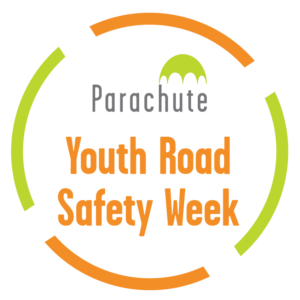
Parachute is changing the name of National Teen Driver Safety Week to Canadian Youth Road Safety Week. Why?
By Valerie Smith
Director of Road Safety Programs
Parachute
For more than a decade, Parachute has led National Teen Driver Safety Week (NTDSW) in Canada supported by Desjardins Insurance and, more recently with support from Transport Canada, created the For Young Drivers, By Young Drivers program to involve more youth in creating our road safety programs and campaigns.
National Teen Driver Safety Week started in 2007 in the U.S., prompted by a spate of fatal road crashes involving high school students in Pennsylvania. It has grown in Canada and the U.S. to an annual campaign, the third full week of October, to encourage teen driver safety.
But language, and understanding, evolve. We discovered through a survey of Canadian youth, and from the 20 members of our first Canadian Youth Road Safety Council created under the For Young Drivers program, that even “teens” don’t identify with the word “teen.” As one 18-year-old put it, “when I think of a teen, I think of someone in Grade 9. I’m going to university in the fall. Something for teens is not for me.”
The problems with “teen” and “driver”
Our NTDSW programs have always been aimed at those aged 15 to 24 because youth and young adults are killed in road crashes at a higher rate than any other age group under 75 years old. With road crashes being the third-leading cause of death among people aged 15 to 24 years old, this age demographic has the highest rate of involvement in fatal collisions per 100,000 licensed drivers. The word “teen” has never accurately described this age group.
As well, fewer youth in Canada are rushing to get their driver’s licences as soon as they are legally able to do so, as getting a driver’s licence now is a longer and more-complex endeavour, thanks to graduating licensing programs. Parts of Canada, notably urban centres with transit options, have reported seeing licensing rates decline. Data compiled by ICBC in British Columbia and extrapolated by Metro Vancouver showed a significant decline among individuals 20- to 24-years-old who hold a driver’s licence in that city. The number fell to 55 per cent in 2017 from 70 per cent in 2014 .
We want road safety to be about safety for all road users: vehicle drivers, their passengers, as well as those who walk, cycle, use public transportation or have other means of travelling in their communities. We wanted our road safety messaging to be relevant to all youth, not just those behind a steering wheel.
Aligning youth road safety and Vision Zero
Many of us working in injury prevention, and until recently this included Parachute, have taken a driver-behaviour-focused approach to road safety: Improve the drivers and we’ll reduce road crashes and fatalities. While driver behaviour remains a factor, we now realize there are so many other forces at play when it comes to creating safe roads for all: we can, we must, build our transportation systems differently to put human safety first, rather than speed of travel. This perspective is at the heart of the Vision Zero safe systems approach, which has as its goal zero fatalities on our roadways.
We realized that continuing to focus on teen driver behaviour solely was at odds with our commitment to the broader Vision Zero perspective.
Thanks to support from Desjardins Insurance and the Honda Canada Foundation, in 2024, Parachute will be expanding our youth road safety initiatives into a year-round program: The Canadian Youth Road Safety Program, with a focused campaign awareness week, Canadian Youth Road Safety Week, happening Oct. 20 to 26, 2024. Our theme for 2024: #OurFutureRoads. Stay tuned for a full roster of activities that will highlight youth empowerment and the role of young people in creating safer roads for all.
Youth Ambassador Program
Parachute will continue to implement the Youth Road Safety Grant Program that began in 2023, now to be known at the Youth Ambassador Program. This initiative will support youth to take a lead on road safety initiatives in their local community by funding youth-led projects that lead to the creation of a proposal to their local community influencers (e.g. policy makers, enforcement, school administration) in support of road safety for all. Youth are invited to apply for the ambassadorship between September 2 and October 4, 2024. Selected winners will have the opportunity to apply a creative youth voice to their projects over a span of eight months.
Our co-pilot, the Canadian Youth Road Safety Council
Our efforts will be co-led by the Canadian Youth Road Safety Council, an active, passionate and diverse group of youth aged 15 to 24 across Canada who want to make roads safer for youth. Recruitment for the 2024-25 council is taking place between June 10 to 24 and each council member will serve a one-year term.
In consultation with the council, we will develop our marketing and communications campaigns, webinars and activities, including information on how parents and caring adults can meaningfully engage youth in road safety conversations.